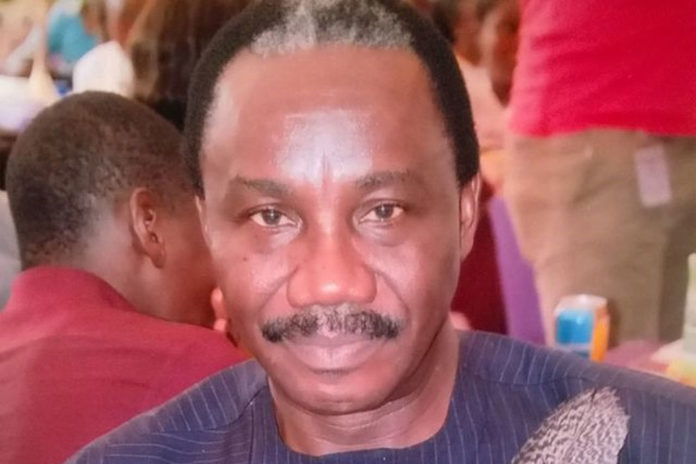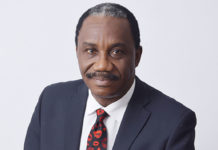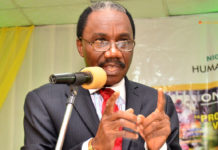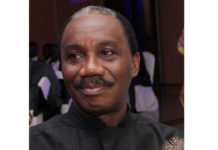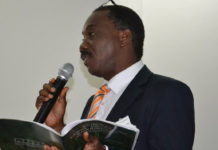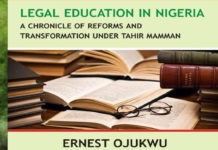Professor Ernest Ojukwu SAN is one of the few exemplary legal practitioners who combine the double recognition as ‘Professor’ and ‘Senior Advocate of Nigeria’ signifying all-round excellence in both the academia and legal practice. Professor Ojukwu has earned the silk not just in recognition of his outstanding and meritorious contributions to legal education in the country but has also displayed an unwavering commitment to upholding the highest ethical standards as a respected member of the Nigerian Bar which he has also served in many capacities in the last three decades.
As a Law Teacher, Professor Ojukwu has influenced thousands of Law students directly through teaching and administration as well as indirectly through the Network of University Legal Aid Institutions (NULAI) platform which has become one of the most significant significant bodies facilitating social justice advocacy in Nigeria. I recently reached out to him to ask a few questions and he was more than gracious to provide very enlightening answers we can all learn a few things from. Please read:
Tobi Adebowale (TA): Can we get some insight into your family background and what motivated you to study law?
Professor Ernest Ojukwu (PEO): My mother was a primary school teacher. My dad was a civil servant. My dream career was journalism but I didn’t pass the entrance examination for Mass Communication. To be candid, Law was not in my mind because my mother never spoke well of some lawyers I knew at Umuahia where we lived. By the time I was ready to take JAMB in 1979, I found out that my community (Ahaba Imenyi in Isuikwuato Abia State) did not have a lawyer. So, I told my dad while completing the JAMB form that I was going to be the first lawyer in my community.
TA: It would appear you joined the academia almost at about the same time you started practising, what did that feel like?
PEO: Oh yes. It felt great and exciting walking into a class of 300 level Criminal Law class students in 1985 and taking charge at 25 years and at the same time almost taking over my boss’s entire litigation dockets at the High Court, Magistrates Court and Customary Court at Chief GNA Atulomah and Co at Aba. The University was also then at Aba and the class had hot heads like Prof. Chidi Odinkalu (former Chairman Human Rights Commission) who did not spare any moment joining issues with my claims on the criminal law subject.
TA: Who were your major influences or mentors at the time?
PEO: My roommate at the University at Ife, Emeka Nwagwu, (former Chairman NBA Owerri Branch) treated me like a younger brother and fired my potential to make one of the best results in my class. I was also influenced, as a student by my one level seniors at school like Chief Tony Idigbe, SAN, and Obidi Umeh, esq. They were quite intelligent and yet very social, outgoing and took part in many extra-curricular activities at Ife. They were very active in mock trials and the Students Court. Tony Idigbe became the Secretary and later the Chairman (Chief Judge) of the Student Court – the University of Ife Judicial Council. I followed Idigbe’s footsteps and became the Secretary and later Chairman (Chief Judge) of the Students Court. Two other persons influenced my career path. My teacher, Prof. Olu Adediran who managed the mock trials. From my third year at school, he continued to tell me that I should consider returning to Ife after graduation to teach. And Chief Awa Kalu, SAN, with whom I did my externship programme (law office attachment) at Aba. He was in Private Legal Practice at J.S, Nwala and Co and teaching at Abia (then Imo) State University at Aba. At the end of my NYSC period, I had three options to take up teaching appointments at the Nigerian Law School, Obafemi Awolowo University Ife, and Abia (then Imo) State University (Aba Campus). I took Awa Kalu, SAN’s counsel to accept the appointment at Abia (then Imo) State University so I could teach and practice like him since I loved both.
TA: Will you consider pupilage as such an essential part of learning the law as to be made mandatory?
PEO: No, I do not think pupilage should be a mandatory programme in Nigeria. As an experiential learning tool, it has enormous benefits for the training of a lawyer in terms of conduct and etiquette, trial advocacy, conference and negotiation skills, drafting and research, etc. But these achievements will have chances only if we also deal with the foundational problems of legal education. The problem with our current low professional standards is our Legal education especially at the LLB level. Until we re-tune training at this level, forcing a mandatory pupilage at this time will be putting something on nothing. And which law firms and lawyers are you going to force pupils on to learn?
The standard of legal education did not fall today or one day. Majority of our practicing lawyers are products of our challenged legal education. I would prefer we re-focus on the LLB and Law School levels. Too many opportunities to prepare would-be-lawyers are being wasted. If we set a goal for legal education (which is non-existent at this time generally), radically change our teaching methodology so that law is taught both as a liberal art and as a vocation, with heavy doses of experiential learning at the LLB and law school levels, we may not need pupilage.
If we must have pupilage, then it is better we take out time to conduct studies on it and properly plan. We need to identify the law firms that can take in pupils. If you ask me, there cannot be more than 10-20 such law firms in most capital cities (except places like Lagos and Abuja). We need to train the first set of Supervisors. We need to write the rules and discuss the rules before implementation. We need to agree on a minimum wage for the pupils, etc.
We need to find out why in England many new lawyers are unable to do their pupils for as many as 5 years and what we will do when we are faced with the challenge of finding pupilage spaces for over 5,000 new lawyers every year. I have a strong belief based on my experience as a practicing lawyer, law teacher at the LLB and Law School levels, Project Director of the NBA Institute of Continuing Legal education, and Pioneer of clinical legal education in Nigeria that the call for a mandatory pupilage is a recognition of the fallen standard of our legal training programmes but a misunderstanding of the reasons for the challenge, and a wrong solution to the problem.
TA: What inspired your interest in social justice?
PEO: I will say my sense of fairness, equity and justice. When I began learning about the clinical approach to legal education, I found that we have a major opportunity in the classroom to raise a new army of lawyers that will become conscious of social justice through Justice and Clinical Legal Education. Though touted on the lips, we really have not been training our lawyers in Nigeria to see, be conscious of, and use law as an instrument of Social Justice.
TA: Can you briefly tell us the story of how NULAI was founded and how it became so impactful?
PEO: Network of University Legal Aid Institutions (NULAI) Nigeria was set up by a group of law teachers who are interested in reforming and transforming legal education in Nigeria and Africa. The goal of NULAI is real and students that have gone through clinical legal education showcase our best in competence, skills and values.
TA: Do you think the Nigerian legal education places enough emphasis on teaching legal aid? What recommendations will you make in this regard?
PEO: Oh no. As a student at Ife, I did not hear the phrase legal aid in my 4 (four) years training. I also did not hear that phrase at the Law School. We were rather told that law was not for the poor. Law Clinics in our Universities today only offer legal aid services. Legal aid is part of the clinical courses. But generally, apart from a few innovative law faculties and law teachers, legal aid, vulnerable persons, Social Justice concerns are not serious discussions in our curriculums and learning. Legal education is still largely traditional, focusing mainly on principles and theories.
TA: What moments will you consider most memorable in your career as a Law teacher and a lawyer?
PEO: Winning my first criminal case at a Preliminary Inquiry at Yola during my NYSC without any assistance by any lawyer or Magistrate; the establishment of our first pilot law clinics in Nigeria, when we took our first set of clinical law students – Dr. Aminu Gamawa and Daniel Bwala both of University of Maiduguri Law Clinic to our first appearance at the Louis M. Brown International Client Counselling Competition at Cardiff UK and we took the 2nd position; when the Nigerian Law School implemented the first ever written curriculum for the Nigerian Law School in 2008/09 – before 2008, the Nigerian Law School did not have a curriculum – we implemented a clinical legal education focused curriculum; the many numerous positive testimonies of my former law students about the impact of my clinical teaching methods in their lives and career; and the fact that clinical legal education is now proposed by the National Universities Commission as a compulsory part of legal education for law faculties in Nigeria. Legal education holds the key to most of our legal profession’s problems. Radically changing what we teach and how we teach law in Nigeria is my dream. It would be my magnum opus to achieve it.
TA: You have played major roles in the Nigerian Bar Association over the years and can critically assess the association’s impact; has the NBA lived up to its potential?
PEO: Not at all. The potentials of NBA have not been scratched. I am currently conducting survey on what lawyers think about this. I will soon release the result. The Bar Association has been actually largely ineffective in many respects in Nigeria.
TA: As a senior member of the Bar, what lapses within the NBA do you believe need to be urgently addressed?
Too many lapses, beginning with our governance structure, to democracy in the bar, openness and transparency, involvement in rule of law, capacity building and welfare of its members especially the young lawyers, tackling of disciplinary issues, ethics of members and corruption of the legal profession, access to Justice and a snail speed administration of Justice.
TA: Some lawyers consider the NBA as a monopoly, what is your take on agitation in some corners that lawyers should not be compelled to join the NBA or pay practice fees to the Association?
PEO: It is in the nature of professional associations to be special. Practice fee is actually in the nature of tax. If you must practice, then you have to pay practice fee. The history of our legal profession made it imperative to transfer the benefits of that tax to the Association to make the Association stand otherwise they would have to depend only on the dues of members. The relationship of lawyers to the Association is Sui genesis and it would take some radical changes in the law to alter. What I think lawyers should be more concerned with is how to make the Association more meaningful and accountable to her members. If the Association has strong impact on her members, the complaints about the system will be minimal.
TA: How will you assess the current level of discipline and regard for ethics in the legal profession?
PEO: Very low
TA: Can you kindly share some of the notable suggestions in the Bill to amend the Legal Practitioners Act you once submitted?
PEO: In 2004, I was Chairman of the NBA Law Reform Committee under President Olanipekun, SAN and we submitted a totally overhauled bill to replace the Legal Practitioners Act. It didn’t go far in the Legislature. So, in 2007 under President Agbakoba, SAN I drafted one that was only an amendment. It got stuck once more in the National Assembly. Under President Daudu SAN (2011-2012), I got involved too in the Committee he set up in making three new Bills that were also sent to the National Assembly – the Legal Practitioners Bill, Legal Education Bill, and the Legal Services Commission Bill. The core reforms in these bills were:
For the Legal Practitioners Act: The strongest focus of the Bill was on discipline in the profession. The Body of Benchers was empowered to set up many Disciplinary Committees at the same time. One of the setbacks to sanctions and naming and shaming (all very vital for fighting indiscipline) has been the fact that there is only one Disciplinary Committee at Abuja dealing with myriad of cases from all over Nigeria. It takes too long to know the outcome of a case. And without an effective communication of outcomes, lawyers usually continue with their impunity since people hardly ever get to know if anybody was sanctioned for infamous conducts. We also formally created the Institute of Continuing Legal Education and the mandatory continuing legal education and re-licensing.
For the Legal Services Commission bill: It created a Commission saddled with the responsibility of investigating the conduct of legal practitioners; receiving and investigating complaints against legal practitioners; inspecting documents, facilities, files, materials, offices, premises and records of legal practitioners to ascertain their statutory compliance status and profile; reporting, presenting, and prosecuting instances of professional misconduct to or before the Disciplinary Committee; enforcing decisions, directions and orders of the Disciplinary Committee; deploying or encouraging ADR for minor complaints against legal practitioners; and advising and educating legal practitioners on proper professional conduct and statutory compliance. The bill’s objectives also included: give consumers and users of legal services an independent, timely, fair and reasonable means of redress for complaints; promote, monitor and enforce high standards of conduct in the provision of legal services and advance integrity in the legal profession; protect and promote public confidence in the legal system, the legal profession, the administration of justice and the rule of law; improve access to justice; encourage an independent, strong, diverse and effective legal profession; increase public understanding of the citizen’s legal rights and duties; and promote and maintain adherence to the professional principles.
TA: Do you see a need to continue to use the wig and gown in Nigerian courts?
PEO: I really feel that our weather is a challenge to that dressing mode. We can get simpler. Even the English man we copied is dropping that dressing. The cost of that dressing is also very high and we are now actually the Country that is keeping the English makers of the wig and gowns going. We spend more money purchasing those outfits from Nigeria than the English people. So, we are wasting our foreign exchange reserve and creating employment for another Country and impoverishing our Country.
TA: On a final note, if you were in a position to articulate and implement reforms in our legal system, please name four initiatives you will immediately focus on.
PEO:
- Make disobedience to court orders, abuse of human rights and rule of law, a crime;
- Transform legal education to justice education and clinical legal education at all levels
- Focus on speedy and efficient justice system and Stop over 80% appeals to the Supreme Court
- Create a Legal Services Commission.



